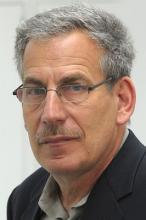
What Is It
Science is, on the one hand, a huge enterprise funded to a great extent by the government and by industry. On the other hand, science is supposed to be the dispassionate, objective search for truth. What happens when the search for truth conflicts with the needs and desires of the funders? Should those funders be allowed to censor the science they pay for? Should scientists be free to publish the truth whatever its effect? John and Ken welcome Ronald Atlas, Past President of the American Society for Microbiology and Graduate Dean at the University of Louisville.
Listening Notes
John and Ken begin by asking whether some scientific knowledge is too dangerous to pursue. As Ken points out, global warming, the possibility of thermonuclear war, and bioterrorism are all products of science. John responds by making a distinction between scientific curiosity, a basic component of human nature, and Science as a powerful human institution, which involves the funding and industrial uses of science. John argues that while inhibiting scientific curiosity itself would be a bad thing, regulating Big Science might not be so bad.
Ken introduces Ron Atlas, Co-Director of the Center for the Deterrence of Biowarfare and Bioterrorism. Ken asks Ron whether there are appropriate limits on the publication of scientific information. Ron suggests that the criterion for justifying restrictions on science is that the science presents a “clear and imminent danger.” Ken then proposes a hypothetical scenario: if thermonuclear annihilation had occurred during the Cold War and if the few survivors were looking back, might they conclude that developing so much science wasn’t really worth it? Ron responds that he and his colleagues have dealt with this question and have vowed that the life sciences must not become the death sciences.
John and Ken raise the question of whether we might go beyond limiting the publication or application of science and limit the very pursuit of scientific knowledge. Ron says that it is the intent of scientists, good or bad, that is the critical factor for determining whether to limit the pursuit of science itself. Ron explains that he and others have been pushing life scientists worldwide to adopt an ethical code for their research.
The discussion moves to questions regarding the relationship between science and social oversight. To what extent would taxpayers be happy if they knew what science their tax dollars was funding? Should we be funneling money into science so fast, or should science slow down in order for society’s ethical wisdom to catch up? Should we consider the effect on future generations of developing science today? Atlas argues that we need science to operate quickly in order to solve existing problems like global warming. Ken adds that while we may not know the risks of all research, we also don’t know the opportunity costs of not letting research proceed.
The episode concludes with a discussion of who should decide how science moves forward. Since we live in a democracy, it seems that the public should decide. Yet Ken wonders: what do politicians and ordinary citizens know about the pursuit of scientific knowledge? And where are our priorities—with the pursuit of pure scientific truth or with the production of socially useful science? John points out that democracies can only decide on what is put before them. Are our politicians adequately informing citizens about basic choices regarding how to spend their science dollars?
- Roving Philosophical Reporter (Seek to 4:05): Zoe Corneli interviews Arnold Kriegstein, director of the Institute for Regenerative Medicine, about the national debate surrounding federal funding of stem cell research.
- 60-Second Philosopher (Seek to 49:55): Ian Shoales speedily recounts two stories that reveal the potential power of ideological influences on science.
